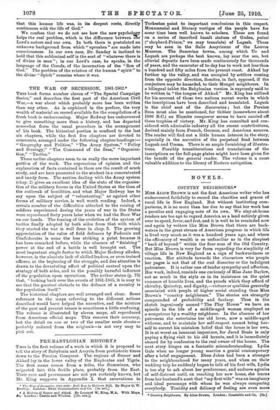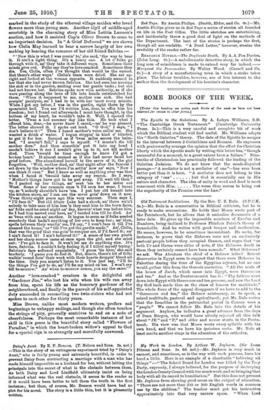NOVELS.
COUNTRY NEIGHBOURS.*
Miss ALICE BROWN is not the first American writer who has endeavoured faithfully to record the charities and graces of rural life in New England. But without instituting com- parisons, it is no more than her due to say that her work has a peculiar and engaging note of its own. We stay-at-home readers are too apt to regard America as a land entirely given over to speed, fever, and fret, and it is well to be reminded now and again by writers like Miss Brown that there are back- waters in the great stream of American progress in which life is lived very much as it was a hundred years ago, and where the effrontery of wealth is as unfamiliar as in the sleepiest "back of beyond" within the four seas of the Old Country. But Miss Brown is very far from regarding the simplicity of village life in New England as a sign of backwardness or reaction. Her attitude towards the characters who people her pages is not that of the cool dissector or the indulgent patroniser. It is rather one of tender sympathy and affection. Her work, indeed, reminds one curiously of Miss Jane Barlow, not so much in the style as in its insistence on the quiet romance of humble lives, and the proofs which they afford of chivalry, Quixotry, and dignity,—virtues or qualities generally associated with people of higher social standing than Miss Brown's "country neighbours." The stories are strangely compounded of probability and fantasy. Thus in the sketch ingeniously named " The Play House " we have an episode in the life of a middle-aged woman employed as a sempstress by a wealthy neighbour. In the absence of her patroness she entertains her old lover, now a middle-aged widower, and to maintain her self-respect cannot bring her. self to correct his mistaken belief that the house is her own. It is at worst an innocent imposture, for Jared Beale is only paying a flying visit to his old haunts, and it is immediately atoned for by confession to the real owner of the house. The next story hinges on a fantastic misunderstanding. Lydia Gale when no longer young marries a genial contemporary after a brief engagement. Eben Jakes had been a stranger to the neighbourhood for many years, and when on their wedding trip he suddenly began to talk of his first wife, Lydia is too shy to ask about her predecessor, and endures agonies of self-distrust until, on reaching her new home, she learns from her husband's aunt that "my first wife" was an imaginary and 'ideal personage with whom he was always comparing everybody. Timidity and delicacy of feeling are even more
• Country Neighbours. By Alioe Brown. London; Constable and Co. [es.]
marked in the study of the ethereal village maiden who loved flowers more than young men. Another idyll of middle-aged courtship is the charming story of Miss Letitia Lamson's auction, and how it assisted Cap'n Oliver Drown to come to an important decision. In "A Grief Deferred" we are shown bow Clelia May learned to bear a sorrow largely of her own making by hearing the romance of her old friend Sabrina :—
"'Now this is what I was comin' to,' she said, the way to bear it. It ain't a light thing. It's a heavy one. A lot o' folks go through with it, an' they take it different ways. Sometimes their minds give out. Folks say they're love-cracked. Sometimes they die. Yes, Clelia, often I've thought that would be the easiest. But there's other ways.' Clelia's tears were dried. She sat up- right and looked at the woman opposite. It suddenly seemed to her that she had never known Sabrina. She had seen her nursing the sick or in the garden, smiling over her gentle tasks ; but she had not known her. Sabrina spoke now with authority, as if she were passing along the laws of life into hands outstretched for them. 'When it happened to me, mother was sick. She had creepin' paralysis, an' I had to be with her 'most every minute. When I got my letter, I was in the gardin, right there by the spearmint bed. You see I'd written him, dear, to offer him his freedom; but I found out afterwards I must have thought, in the bottom of my heart, he wouldn't take it. Well, I opened the letter. 'Twas a hot summer day like this. He took what I offered him, dear,—he never knew I cared,—an' he was pleased. The letter showed it. I spoke out loud. " 0 God," I says, " I don't believe it !" Then I heard mother's voice callin' me. She wanted a drink o' water. I begun steppin' in kind o' blinded, to get it for her. Seemed as if 'twas miles across tho balm- bed. "I mustn't fall," I says to myself. " I mustn't die till mother does." And then somethin' put it into my head I needn't believe it nor I needn't give up to it, not till mother died. Then 'twould be time enough to know I'd got a broken heart.' It almost seemed as if she had never faced her grief before. She abandoned herself to the savor of it, the girl forgotten. 'Well, mother died, an' that night after the funeral I set down by the window where I'm satin' now an' says, " Now I can think it over." But I knew as well as anything ever was that when I faced it 'twould take away my reason. So I says, " Mother's things have got to be put away. I'll wait till then." So I packed up her things, an' sent 'em to her sister out West. Some o' her common ones 't I'd seen her wear, I burnt up, so 't nobody shouldn't have 'em. I put her old bunnit into the kitchen stove, an' I can see the cover goin' down on it now. 'Twas thirty-eight years ago this very summer. Then says I, "I'll face it." But old Abner Lake had a shock, an' there wa'n't nobody to take care of him less 'n they sent him to the town farm, an' folks said he cried night an' day, knowin' what was before him. So I had him moved over here, an' I tended him till he died. An' so 'twas with one an' another. It begun to seem as if folks needed somebody that hadn't anything of her own to keep her ; an' then, spells between their wantin' me, I'd say, " I won't face it till I've cleaned the house," or " till I've got the gardin made." An', Clelia, that was the grief that was goin' to conquer me, if I'd faced it; an' I ain't faced it! I ain't believed it !' A sense of her own youth and her sharp sorrow came at once upon the girl, and she cried out: I've got to face it. It won't let me do anything else. It's here, Sabrina. I couldn't help feeling it, if I killed myself trying.' Sabrina's face softened exquisitely. ' I guess 'tis here,' she said tenderly. ' I guess you do feel it. But, dearie, there's lot of folks w elkin' round dein' their work with their hearts droppin' blood all the time. Only you mustn't listen to it. You just say, "I'll do the things I've got to do, an' I'll fix my mind on 'em. I won't cry till to-morrow." An' when to-morrow comes, you say the same:"
Another " love-cracked " creature is the delightful old " Gardener Jim," who lost his wits when his wife ran away from him, spent his life as the honorary gardener of the neighbourhood, and finally in the pursuit of his self-appointed duty succeeded in reconciling two twin-sisters who had not spoken to each other for thirty years.
Miss Brown, unlike most modern writers, prefers sad beginnings to unhappy endings, and though she often touches the strings of pity, generally contrives to end on a note of cheerfulness. Perhaps the most remarkable instance of her skill in this genre is the beautiful story called "Flowers of Paradise," in which the heart-broken widow's appeal to God for a special sign is so strangely and mercifully answered.























































 Previous page
Previous page